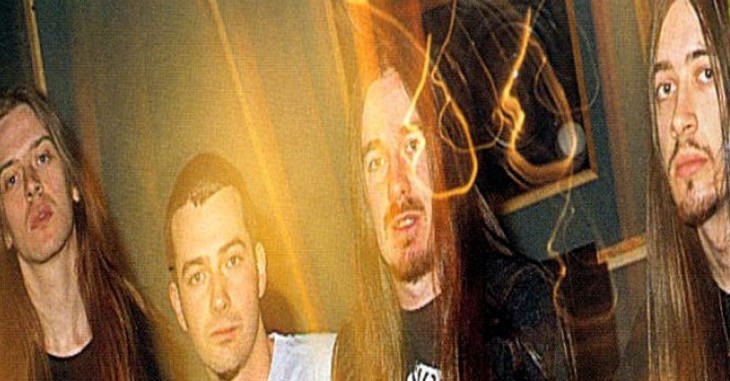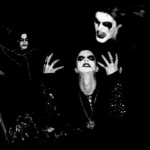10 Essential Death Metal Albums

Some years have passed since death metal was in its prime, though it’s as brutal and ugly as ever, even if many of the pioneers have either moved on or changed course. But this weekend marks the annual Maryland Deathfest, which isn’t entirely death metal in nature, yet still puts an emphasis on the super heavy and, if you will, “br00tal.” In the spirit of getting ghoulish and vile, we put together a list of our favorite death metal albums. Since we limited it to 10, we had to leave out a lot of favorites (Asphyx, The Crown and Cynic, just to name a few). But the 10 essential death metal albums we chose most certainly rule. Get in the pit with us!
 Death – Scream Bloody Gore
Death – Scream Bloody Gore
(1987; Combat)
Buy at iTunes
The late Chuck Schuldiner didn’t leave any room for misinterpretation when he formed Death in the mid-’80s. This band was not going to ride the new wave of death metal; Death was going to legitimize it. Every second of Death’s 1987 debut Scream Bloody Gore is designed to make arm hair stand on end when listening on record, and make all limbs flail in angst-driven moshing when listening live. The first three words on the first song, “Infernal Death,” are “die,” “die,” and “die.” What makes Death stand out is the lack of pretense: the songs are modest in length, the main riffs display punk-like simplicity, and guitar solos, while well-executed, are brief. The end result is a collection of tight, no-nonsense, straight-to-the-point songs about zombies, corpses, mutilation, and so on. To top it all off, Schuldiner’s voice has personality, a tone that emotes beyond mere screaming. He screams bloody gore left and right, but he does so with purpose. The end result is a palatable dozen tracks that provide a clinic on how to deliver death metal effectively and efficiently.- CG
 Bolt Thrower – Realm of Chaos
Bolt Thrower – Realm of Chaos
(1989; Earache)
Buy at iTunes
Coventry, England’s Bolt Thrower, much like every other UK death metal band worth their salt (Carcass, Napalm Death) began as a grindcore band, but eventually opted to slow down their breakneck blasts in favor of getting down, dirty and guttural. It’s a pretty logical progression, actually, and in the case of Bolt Thrower, one that worked out pretty great for them in the long run. Picking a starting point for the band, however, can almost be done totally blindly, as just about all of their albums feature a similar ratio of grooves to roars to nasty-sounding distortion and nigh-grind breakdowns. And they all more or less kick ass. But Realm of Chaos was their first great album, and thus stands as a proper introduction to the English bulldogs. There’s an uncompromising assault on “Eternal War,” groovy riff action on “Through the Eyes of Terror,” and even a touch of doom on “All That Remains.” And if you dig this one, their other seven albums are pretty rockin’ too. – JT
 Morbid Angel – Altars of Madness
Morbid Angel – Altars of Madness
(1989; Combat)
Buy at iTunes
Excuse me, waiter? There are demons in my soup! Tampa-based death metal pioneers Morbid Angel wore evil on their album sleeves proudly, and in their lyrics, song titles and just the general onslaught of vile filth they vomited forth. Oh, and that’s a good thing, if you couldn’t tell. Much like their peers in Death, Morbid Angel’s sound was deeply indebted to the extra-Satanic thrash metal sound of Slayer, as well as UK black metal precursors Venom, not to mention grindcore pummelers like Napalm Death. On their debut full-length, Altars of Madness, almost all of Morbid Angel’s tracks end up blasting into a relentless sprint, as if chasing down the innocents with their hell-born sonic creations. The album is a death metal classic, not just because it hams up the blasphemy, but because it merely rocks so damn hard. – JT
 Entombed – Left Hand Path
Entombed – Left Hand Path
(1990; Earache)
Buy at iTunes
Stockholm’s Entombed is responsible for pioneering one of the most simultaneously filth-encrusted and yet somehow streamlined guitar sounds in all of metal. The group clearly wore their crust punk influence a little more brazenly than several other deathmongers, and typically played at speeds highly unsafe for the novice metalhead. A quick listen to the title track on Left Hand Path, and it’s pretty obvious that Slayer were highly instrumental in informing their menacing muck, but Entombed took that thrash metal template and made it extra laser focused, with an even more noxious level of overdrive compressing their crusty elements into their own vile diamonds. But more than simply making ugly sounds more efficiently, Entombed found a proper balance between fun and fury. They did, more or less, invent death ‘n’ roll, after all — listen to “Revel in Flesh” and tell me that’s not a hoot and a half. – JT
 Atheist – Unquestionable Presence
Atheist – Unquestionable Presence
(1991; Death)
Buy at iTunes
Some death metal bands prefer to stick to a pretty raw and searing variation on thrash metal. Others, like Atheist, blend in a fusion of prog-rock, funk, jazz and mathematically complex rhythms that defy easy categorization. Where their debut album Piece of Time laid down a template for their jaw-dropping mixture of virtuoso musicianship and fierce death metal harshness, Unquestionable Presence took it to the next level, leaping from a dizzying cascade of bass fretwork to powerfully harmonized guitar riffs to high speed chugs that undercut their lighter moments with heaviness that never fully crushed, but definitely churned. This album might require a few repeat listens to absorb all of the crazy shit going on, but no matter how overwhelming it is, even catching 50 percent of the action is worth it. – JT
 Dismember – Like an Ever Flowing Stream
Dismember – Like an Ever Flowing Stream
(1991; Nuclear Blast)
Buy at iTunes
Played side by side, the best and burliest of death metal bands from both North America and Sweden would sound perfectly at home with one another on the same playlist, but the differences are pretty remarkable, to say the least. In the States, ugly reigned supreme, while Sweden’s death kings mostly abandoned sluggish churn for the sake of speed and efficiency, far closer in aesthetic to crust punk. Dismember’s short-but-searing debut Like an Ever Flowing Stream puts that principle in practice, and does so nearly perfectly. While a handful of tracks veer close to the six-minute mark, the group plays each track with the intensity and amphetamine-pulse of hardcore. The group’s pneumatic-drill guitar riffs turn “Override of the Overture” into a lightning sprint through the caverns of hell. And the ethereal chants that break up the vicious chug of “And So Is Life” only give brief reprieve from the relentless brake-free ride through their death ‘n’ roll gauntlet. It’s albums like this that make you wonder why more punks and metalheads can’t just wrap their arms around each others denim vests and become comrades for the sake of pit brotherhood. – JT
 Carcass – Heartwork
Carcass – Heartwork
(1993; Earache)
Buy at iTunes
Melodic death metal — or melodeath, for short — has frequently been a source of skepticism or derision from die-hard death metal fans. The reasoning behind it, as far as I can tell, is that if you want something as harsh or as punishing as death metal, then you definitely don’t want something with pop appeal. But there are always ways to satisfy two needs at once. Carcass, a UK band that started out playing grindcore, evolved into a spectacular melodeath band by 1993’s Heartwork. It’s very much a death metal album, with some riffs and guitar tones that scrape like iron barbs against a sewer grate. But it also contains some of the most soaring melodies of any death metal album, its brightest moments, like the title track, recalling Iron Maiden as much as it does Morbid Angel. Carcass were never a band to stick too strictly to tradition, though; they’re the only death metal band I know of that has covered Björk. – JT
 At the Gates – Slaughter of the Soul
At the Gates – Slaughter of the Soul
(1995; Earache)
Buy at iTunes
At The Gates began fairly inconspicuously in 1990, its members having been entrenched in the death metal and punk rock scenes in Gothenburg, Sweden. Their debut album was the sound of a band trying to find their footing, but with each successive release, At The Gates’ sound grew exponentially. Their third record, 1994’s Terminal Spirit Disease, saw the band’s sound develop and reach the cusp, but it wasn’t until their fourth (and final) album, Slaughter of the Soul in which they really broke through. Featuring dual harmonic guitar leads, rapid fire but groove-inspired percussion, neo-classical elements and far more introspective lyrics than usually featured in death metal, Slaughter of the Soul became an instant classic. The success of the album couldn’t save the band however. In 1996, the Bjorler brothers left the band causing the group to split, but the legacy of Slaughter of the Soul was firmly in place. Spearheading the melodic death metal movement, At The Gates (along with In Flames and Dark Tranquility) helped pave the way for countless other metal bands worldwide. – RB
 Gorguts – Obscura
Gorguts – Obscura
(1998; Olympic)
Buy at iTunes
The funniest description I ever read regarding Canadian death weirdos Gorguts is that their 1998 album Obscura sounded like a band throwing its instruments down a flight of stairs. But it’s also comically reductive. Despite having a fairly conventional death metal name (“Gore” + “Guts”), Gorguts don’t do much else that could be called conventional by standards of the genre. Obscura, in particular, is a masterpiece of twisted arrangements, mangled tempos and instrumentation that, at least on the surface, seems entirely impossible to replicate. It’s essentially death metal’s version of Captain Beefheart’s Trout Mask Replica, a piece of brutal fusion that has few, if any peers, and makes little sense on first listen. But the intricacy and artistry of the bizarre sounds on the album are what make it worth revisiting time and time again. It’s a complex piece of work, but the time it takes to untangle its web is well spent. – JT
 Opeth – Blackwater Park
Opeth – Blackwater Park
(2001; Koch)
Buy at iTunes
Though the members of Opeth might not have literally labeled it as such, the real “watershed” in their career was probably in 2001 (not 2008), when they released Blackwater Park. On this album — Mikael Akerfeldt’s first formal collaboration with Steven Wilson — the classic rock fascination that lay buried within the death metal of Opeth’s earlier albums slowly emerges to the surface. The dynamism that marks Blackwater Park is exemplary of this, prefiguring Opeth’s later explorations into dramatic contrast of tone in Damnation/Deliverance. Songs like “Bleak” and “The Funeral Portrait” move deliberately through extended, instrumental sections to crushing metal, foreshadowing Watershed. Progressive guitar composition in songs like “Dirge For November” seems to contain early traces of Heritage. Most importantly, though, Opeth keeps the music engaging while conducting this stylistic shift, building tension throughout the album and closing it perfectly with “Blackwater Park,” a progressive death metal epic that ranks among the best songs they’ve ever written. – CB
You might also like:




